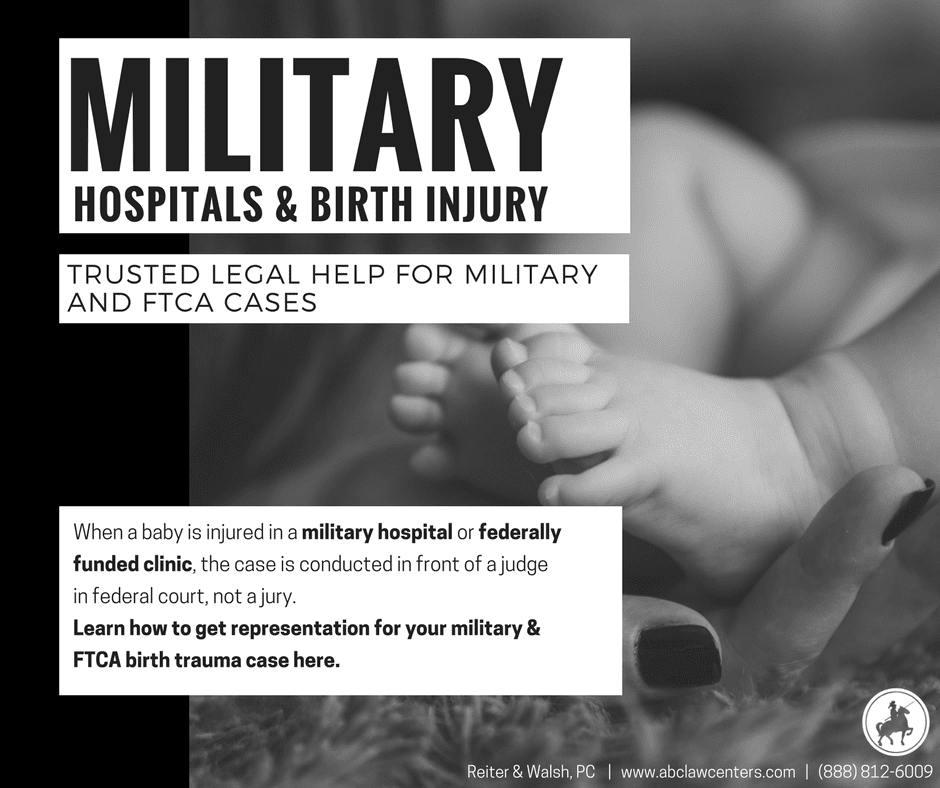Birth Injuries and Military Medicine
Legal help for birth injury cases | FTCA and military medical malpractice
Medical malpractice cases involving a military hospital or practitioner are conducted in front of a judge in federal court, rather than in front of a jury as in civilian courts.
In a military setting, there is a different set of regulations regarding who can and cannot pursue a medical malpractice suit. In order for a suit to succeed, clients must hire attorneys that have specific experience in handling military medical malpractice cases.

ABC Law Centers: Birth Injury Lawyers | Detroit, Michigan firm handling military birth injury cases
ABC Law Centers: Birth Injury Lawyers attorneys are highly skilled in birth injury and military medical malpractice law. Their experience allow them to successfully litigate these complex cases, and they are committed to helping families impacted by birth injury get justice and obtain the funds necessary to pay for their children’s extensive medical bills and other necessities.
The Federal Tort Claims Act (FTCA) and federally-funded hospitals
What makes FTCA litigation different?
Veterans Administration Hospitals (‘The VA’), military facilities, and federally-funded clinics are under the jurisdiction of the federal government. This means that a lawsuit against these facilities is a suit against the government. Usually, the government has ‘sovereign immunity,’ protecting it from lawsuits, but the Federal Tort Claims Act (FTCA) provides an exception, letting people injured at these hospitals get the compensation they deserve. However, the FTCA prevents certain people from suing at all, because of a ruling called the Feres Doctrine. Also, certain employees can’t be sued under the FTCA, which contains a great deal of fine print:
- Active military personnel cannot sue under the FTCA due to the Feres Doctrine. If they receive poor-quality healthcare that results in an injury in a military hospital, it is considered to be an injury in the line of duty, and they are barred from seeking compensation.
- Military personnel who had an injury while being treated at a hospital in a foreign country cannot sue under the FTCA, because the FTCA has a ‘foreign-country’ exclusion. This applied even if the service member was treated on a U.S. military base. They can attempt to sue under the Military Claims Act or the Foreign Claims Act instead.
- Non-active military personnel can sue, and the dependents of active-duty military personnel can also sue.
- Only federal employees can be sued under the FTCA – private contractors can’t. If a doctor is a private contractor, normal medical malpractice law applies.
- The negligence must have been within the scope of the federal employee’s job.
Even though there are many limitations on FTCA cases, such cases are worth pursuing, so looking into the process may still be beneficial for families of children who received birth injuries in military hospitals.
What does a claim under the FTCA look like?
Individuals injured by malpractice in a military hospital or federally-funded clinical must file an FTCA claim within two years from the “date the claim accrued.” Often (if not always) the “date the claim accrued” is the date the injury occurred. In the case of birth injury, that often means that the lawsuit must be initiated before the baby is two years old. This two-year time frame is called the FTCA “statute of limitations,” or SOL, and it applies to both adults and minors. In some cases, the SOL can be longer (due to military service).
When parents file a claim for a birth injury at a military hospital, they must fill out a document called the ‘Standard Form 95.’ Whatever they fill out on the form is the maximum limit they are allowed to be compensated for, so it is very important to understand all the damages that may have occurred because of the malpractice.
The medical facility has six months to review the claim and decide what to do – they can either:
- Pay the claim in full
- Settle the claim for less than the requested amount
- Reject the claim (or fail or respond within the six-month time period)
If the claim is rejected, the plaintiffs (which are often the parents of the baby with a birth injury) have to file a lawsuit in federal court within six months.


Legal help for families impacted by birth injuries at military hospitals
If your baby or loved one had a birth injury such as cerebral palsy (CP) or hypoxic-ischemic encephalopathy (HIE) after getting care at a military hospital, ABC Law Centers: Birth Injury Lawyers may be able to help. Our firm has focused exclusively on birth injury litigation since the firm’s inception in 1997, and our attorneys have the experience needed to help families secure their children’s future. From our primary location in Metro Detroit, Michigan, we help clients all over the United States. We would be happy to evaluate your case and speak to you about your legal options; you may reach out to us 24/7. We will keep your information completely confidential, and you pay absolutely nothing unless we win or settle your case.
Featured Videos
Posterior Position
Hypoxic-Ischemic Encephalopathy (HIE)

Featured Testimonial
What Our
Clients Say…
After the traumatic birth of my son, I was left confused, afraid, and seeking answers. We needed someone we could trust and depend on. ABC Law Centers: Birth Injury Lawyers was just that.
- Michael


